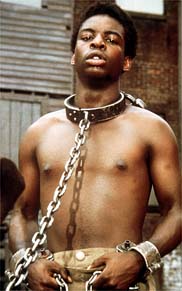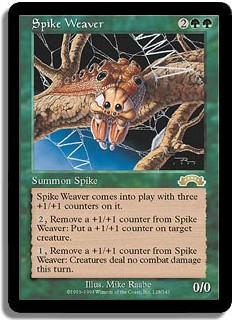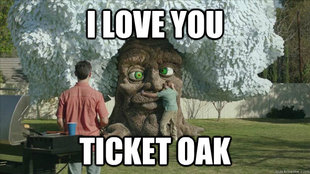I threw a deck once.
Even though it's absurd, I give you permission to judge me. We all have moments in life we aren't proud of.
You just better hope I never find out that you own all the seasons of Sex And The City, or whatever. Kidding. But seriously. I will make fun of you.
Anyway, I wouldn't be able to accept my transgressions and talk about this embarrassing moment it if I were still having tantrums and throwing cards around.
Unless I was Gambit.
 |
| Don't throw cards. Unless they're on fire. |
|
Cause Gambit's awesome.
To be fair, my
Intet, the Dreamer deck wasn't really the first bad deck I built. Just bad for me.
The cards in it weren't bad.
I know because I spent a lot of money on the deck, trying to make it work.
I wanted it to be my "Holy Grail" deck, complete with all the mana ramp and counterspells and a long line of creatures for the All-You-Can-Spitting-Image Buffet.
At the time, the majority of our playgroup had been busy with school, work, and other important life goals like getting wasted on weekends so they could have unplanned pregnancies(Kidding. We're nerds), so the metagame was mostly just me and Grandpa Growth.
No matter how hard I played this deck, I was always one card draw away from changing the game, which was weird, because I played Time Warp in a lot.
GG and I were playing more since it was just us, so it wasn't uncommon to play for upwards of 12 hours in any given week.
One weekend, we're playing, and I must've lost 8 straight games or so. I don't know. Maybe I won a game against this bad Olivia Voldaren deck he was playing.
Anyway, it was late, and I was mad, and I couldn't take it. I lost my temper. I flung the deck at the wall, and watched as the black sleeves hit the white wall, floating to the floor in a hundred different pieces.
Intet, the Dreamer had crushed my dreams.
If there's any semblance of poetry here, that's it.
And just like Ron Burgundy, when I fell, I fell hard.
 |
| Intet was a bad choice. |
Half the deck was apart when I realized something- All my decks needed to be rebuilt.
They were clunky, misshapen Hunchbacks of Notre Deck-making, and they'd gotten this way because I'd been too focused on playing the same cards. They were uninspired, unfun, "I-wanna-win-at-all-costs" decks.
Much of what followed you can follow pretty logically if you've read my philosophies on deck-making, but it bears repeating in a different way, if only to illustrate how I've come to be a much better player and deckbuilder than I used to be.
This is an important dichotomy- player and deckbuilder. Not all of us are both, or even good at either. It happens.
However, to be good at one does require us to know something about the other half.
When I went back to the drawing board, I started with a strange exercise. I wrote down in sentence form everything that I wanted my future decks to do. They were pretty general, as I tried to avoid certain tribal/mechanical specificity, but this is what I wrote down as goals for my decks:
I want my deck to have a sweet, solid, consistent mana base.
I do not want to miss land drops between my first turn and my seventh.
I want my deck to have a good theme and be interactive with other players.
I want my deck to have surprises, but be a combination of cards that have real synergy.
I want my deck to not necessarily be original, but to have my stamp on it.
I want my deck to be filled with cards I want to play with and cards I'm excited about.
I want my deck to have a smooth feel, void of rough cards and clunky cluttered-ness.
(I'll elaborate later.)
I want my deck to be designed to win, with and without the help of my Commander.
I want my deck to be complicated, with many lines of play.
I want my deck to be fun and as interesting to play with as it is to play against.
I want my deck to win the long, tough, challenging games.
I want my deck to have cards that allow me to make creative, strategic choices, such as whether I choose to play a spell on my turn or my opponent's turn.
I want all my decks to play Solemn Simulacrum. Forever.
I want to have the confidence that I can find an answer in my deck, especially when I need it most.
I want a deck that I don't have to mulligan often.
I want my deck to be somewhat inspired.
I want a deck that I love to play.
Maybe some of these are goals for you, I don't know. Writing this down and seeing it in front of me really helped though.
Since I'd made this commitment to myself to be a better player and deckbuilder, I started watching Luis Scott-Vargas and Conley Woods on Channel Fireball. I'd watch them draft, play standard, legacy, modern- anything.
I wasn't looking to watch them win, either. I was looking to see how they handled the kind of adversity I'd faced that night. I wanted to see them lose.
It took me a while, but I found some games where they were just particularly awful all around- Playing, drawing, responding.
What I discovered was that, even in those games, Conley and LSV would just laugh it off. Sure, they were mad and upset probably- but they sucked it up, and moved on to the next game, wherever that was.
Luck is a part of this game, after all. Even though these guys are mostly insanely lucky, they do occasionally eat the bear.
 |
| Honk if you get this reference. |
As a player, I knew that I wasn't going to get much better at Magic. However, as a deckbuilder I could fortify my inabilities and establish more consistency, so I wasn't playing against myself and my opponent. I needed to be a master of my own interactions.
Now, before my decks find themselves in the throes of a vicious cockfight, there's way more preparation involved.
In building the deck, there's a pretty huge research level. This is where I sit down at the computer and spend an hour or so compiling a list of cards that could work. Usually, this involves a hefty portion of combing other people's tech and doing some Gatherer searching.
More often than not, I don't have too much intention with what I'm going to do in the deck before I decide to build it. That happens as I'm looking at patterns in the list. The inspiration hits me pretty immediately though when it happens.
The next step is pulling cards out of my binders. This used to be the primary step- just making due with what I had. This isn't a bad approach- it's just limited. I've just got myself trained now to know what's a rough draft of a deck and what the envisioned "better" version might be, if I don't have the cards immediately at my disposal.
I talked about sleeving up the general and staring at it in my previous article about deckbuilding. For me, there's something complete about arranging it that makes me feel good when I start, or I'm having trouble with carrying the theme. It's a good habit to go back to your general if you feel like a card might not be part of any useful strategy with the deck. I do a lot of Commander staring.
After I've sleeved the deck up, I start doing sample draws.
If you do a lot of deck posts online, that's cool. However, if you intend to use the sample hand draw, I'd sway you against it.
This is because everyone has a natural shuffle technique, and it's important to find out what you're drawing when you're the one shuffling.
Many times, I've taken certain cards out on the sole basis that I draw them too many times in my opening hand, and they aren't useful to me at that point. I'll admit I'm a little superstitious, so I'll go as far as merely just switching up what sleeve a certain card is in if I want to keep the card, but draw it instead of begin with it.
One of the biggest parts of my sample draw is that I actually attempt to play out several turns. I'd say a good ballpark range is anywhere from five to seven, playing until you feel like the obviously uncontested board state you have will win the game.
I tend to repeat this process until I feel really confident that I'm going to make all my land drops. This is especially helpful if you play tutors and search your library a lot, because it helps you to know what you're looking for faster than average. Simple economics.
The more you do this, the more you'll be able to see what's a really good opening hand and what isn't. You'll also start to figure out what could be a bad card choice.
It always bums me out to have to edit decks because I wanna get it right the first time, but this is a natural part of the process that I've gotten used to.
The good news though, is that hopefully what you need was either in your original pool of cards or it was on your list of stuff to get.
If it isn't, there's probably a massive deck overhaul coming. Be prepared for that.
Sometimes though, your deck doesn't even get out of the gate. It doesn't happen often, but you need to know what that looks like.
My example is a Wrexial deck. I tried to make this deck several months ago, and I started with my usual allotment of 40 land.
During the sample draw phase, I found I wasn't getting enough land consistently to cast anything in my hand.
So I bumped the land number up to 44, adding some cycle land and switching out a few spells for some extra card draw.
Still didn't draw enough land. Even worse, the land I was drawing wouldn't even help me cast what was in my hand. And there were 10-plus basic Islands and Swamps.
Don't be afraid to toss a deck if you're getting bad mojo like this. If it happens here, it's possible it'll happen twice as much at the table.
Because I do more deck prepwork before I sit down to play, my decks tend to perform a whole lot more consistent. Also, my stress level and intensity are lower because I've practiced with the deck, so I know what cards will be good top decks for situations and what won't help me.
This, in turn, has helped me to become a better player overall because I'm playing my decks better. More importantly, I'm able to feel good about what I was able to accomplish in a game, regardless of whether or not I win or lose.
Do I still play to win? Absolutely. I've said it before and I'll say it again. If there's a part of you that doesn't want to win, you probably shouldn't be playing Commander.
I mean that in the nicest way possible. This is the format where you get to do everything, even though a lot of plays are pretty rough and horrible and sometimes downright unfun.
I'm at a point where I feel good about my decks.
They're not perfect, but they're much closer to my goals.
I'd also like to help you if you're not on the right track. That's what the site is here for.
Well, that, and for me to have something to do in between games.
So if you need help, feel free as always, to leave comments or contact me at UncleLanddrops@gmail.com.
Peace, Love, Landdrops.
-UL




















